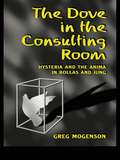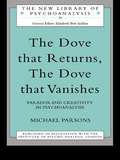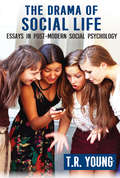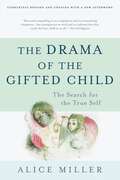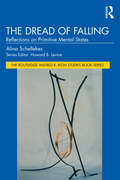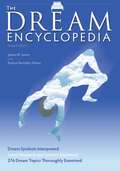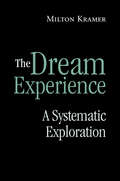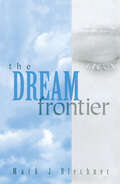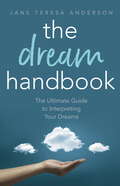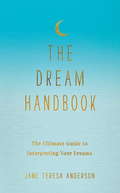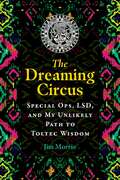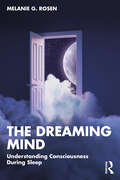- Table View
- List View
The Doula Book: How a Trained Labor Companion Can Help You Have a Shorter, Easier, and Healthier Birth
by Marshall H. Klaus John H. Kennell Phyllis H. KlausMore and more parents-to-be all over the world are choosing the comfort and reassuring support of birth with a trained labor companion called a "doula." This warm, authoritative, and irreplaceable guide completely updates the authors' earlier book, Mothering the Mother, and adds much new and important research. In addition to basic advice on finding and working with a doula, the authors show how a doula reduces the need for cesarean section, shortens the length of labor, decreases the pain medication required, and enhances bonding and breast feeding. The authors, world-renowned authorities on childbirth with combined experience of over 100 years working with laboring women, have made their book indispensable to every woman who wants the healthiest, safest, and most joyful possible birth experience.A Merloyd Lawrence Book
The Dove in the Consulting Room: Hysteria and the Anima in Bollas and Jung
by Greg MogensonPsychoanalysis began as a treatment for hysteria over a century ago, and recently has returned to hysteria as a focus, most notably in the works of Christopher Bollas and Juliet Mitchell. This provocative and original book critically engages with psychoanalysis and in particular the phenomenon of the return of hysteria to analysis, from a Jungian perspective, asking such questions as, what is the purpose of the concept of hysteria in psychoanalysis? What does it say about the concept of the soul, and of the analytical culture? What place does spirituality generally have in psychoanalysis - what place for the dove in the consulting room?Drawing on the works of Jung, Bollas, Hillman and Giegerich, the author provides a rich rejoinder to Bollas's proposed theory of hysteria, and provides a unique Jungian analysis of analysis itself - both Freudian and Jungian. The Dove in the Consulting Room is illuminating reading for the professional analyst and for anyone interested in the spiritual and cultural importance of psychoanalysis and analytical psychology.
The Dove that Returns, The Dove that Vanishes: Paradox and Creativity in Psychoanalysis (The New Library of Psychoanalysis #Vol. 39)
by Michael ParsonsThe nature of psychoanalysis seems contradictory - deeply personal, subjective and intuitive, yet requiring systematic theory and principles of technique. In The Dove that Returns, The Dove that Vanishes, Michael Parsons explores the tension of this paradox. As they respond to it and struggle to sustain creatively, analysts discover their individual identities. The work of outstanding clinicians such as Marion Milner and John Klauber is examined in detail. The reader also encounters oriental martial arts, greek Tragedy, the landscape painting of John Constable, a Winnicottian theory of creativity and a discussion of the significance of play in psychoanalysis. From such varied topics evolves a deepening apprehension of the nature of the clinical experience. Illustrated throughout , The Dove that Returns, The Dove that Vanishes will prove valuable to those in the field of psychoanalysis, and to those in the arts and humanities who are interested in contemporary psychoanalytic thinking.
The Drama Free Workbook: Practical Exercises for Managing Unhealthy Family Relationships
by Nedra Glover TawwabFrom the New York Times bestselling author of DRAMA FREE and SET BOUNDARIES, FIND PEACE, a hands-on resource for understanding and working through dysfunctional family dynamics - and recognizing when to walk awayFamily can be a source of connection, and a source of conflict. In this exercise-filled workbook, licensed therapist and bestselling relationship expert Nedra Glover Tawwab offers powerful insights along with thought-provoking questions to help you unpack what's really going on - and express your needs and expectations going forward. Whether you are coping with a long-term pattern of emotional neglect, addiction, or abuse, or trying to understand a new conflict that's come up with a parent, sibling, or in-law, you will find empowering information and tools to help you manage these complex relationships in a way that offers psychological safety and honors the person you truly are.
The Drama Free Workbook: Practical Exercises for Managing Unhealthy Family Relationships
by Nedra Glover TawwabFrom the New York Times bestselling author of Drama Free and Set Boundaries, Find Peace, a hands-on resource for understanding and working through dysfunctional family dynamics—and recognizing when to walk awayFamily can be a source of connection, and a source of conflict. In this exercise-filled workbook, licensed therapist and bestselling relationship expert Nedra Glover Tawwab offers powerful insights along with thought-provoking questions to help you unpack what&’s really going on—and express your needs and expectations going forward. Whether you are coping with a long-term pattern of emotional neglect, addiction, or abuse, or trying to understand a new conflict that&’s come up with a parent, sibling, or in-law, you will find empowering information and tools to help you manage these complex relationships in a way that offers psychological safety and honors the person you truly are.
The Drama of Everyday Life
by Karl ScheibeScheibe brings to his reflection on psychology the drama of literature, poetry, philosophy, history, music, and theater. Challenging our dispirited senses, he asks us to take note of the self-representation, performance, and scripts of the drama that is our everyday life.
The Drama of Social Life: Essays in Post-modern Social Psychology
by T. R. YoungThese essays explore the many ways theater and dramaturgy are used to shape the everyday experience of people in mass societies. Young argues that technologies combine with the world of art, music, and cinema to shape consciousness as a commodity and to fragment social relations in the market as well as in religion and politics. He sees the central problem of post-modern society as how to live in a world constructed by human beings without nihilism on the one hand or repressive dogmatism on the other.Young argues that in advanced monopoly capitalism, dramaturgy has replaced coercion as the management tool of choice for the control of consumers, workers, voters and state functionaries. Young calls this process the "colonization of desire." Desire is colonized by the use of dramaturgy, mass media, and the various forms of art in order to generate consumers, vesting desire in ownership and display rather than in interpersonal relationships with profound consequence for marriage, kinship, friendship and community. While Young focuses his critique on capitalist societies undergoing great changes, he insists that the same developments are to be found in bureaucratically organized socialist societies.The Drama of Social Life is of interest to those who study theories of moral development, cultural studies, the uses of leisure, politics, or simply the uses of "make believe." It is intended for the informed lay public as much as for social psychologists.
The Drama of the Gifted Child: The Search for the True Self, Third Edition
by Alice MillerWhy are many of the most successful people plagued by feelings of emptiness and alienation? This wise and profound book has provided thousands of readers with an answer--and has helped them to apply it to their own lives. Far too many of us had to learn as children to hide our own feelings, needs, and memories skillfully in order to meet our parents’ expectations and win their ”love. ” Alice Miller writes, ”When I used the word ’gifted’ in the title, I had in mind neither children who receive high grades in school nor children talented in a special way. I simply meant all of us who have survived an abusive childhood thanks to an ability to adapt even to unspeakable cruelty by becoming numb. . . Without this ’gift’ offered us by nature, we would not have survived. ” But merely surviving is not enough. The Drama of the Gifted Child helps us to reclaim our life by discovering our own crucial needs and our own truth.
The Dread of Falling: Reflections on Primitive Mental States (The Routledge Wilfred R. Bion Studies Book Series)
by Alina SchellekesThe Dread of Falling: Reflections on Primitive Mental States offers a comprehensive and original view of primitive mental states from a psychoanalytic perspective, allowing the reader to understand the nature of these states from developmental, theoretical and clinical vantage points.The book begins with a review of early mental development and its relevance to the understanding of primitive mental states. Alina Schellekes explores major primary anxieties of being and considers object relations that characterize loose or shattered structures of the self. "The dread of falling" both describes a concrete anxiety prevalent in such states and serves as a metaphor and common thread through the book to portray the deep dread of losing base with one’s meaningful objects. Schellekes looks at how, in cases of severe developmental deprivation or late-onset trauma, mental void structures or states of emotional indigestible excess may evolve, creating complex challenges in the analytic process. Schellekes explores various mental survival tactics that are often developed and deployed by patients finding themselves in such extreme cases: omnipotent self-holding defences, autistic manoeuvers, rebirth fantasies and excessive daydreaming. She discusses the quality of analytic presence that is necessary when facing unrepresented mental layers and uncentered states of mind, so as to minimize the risk of toxic states in analysis and of premature terminations.Including perceptive analyses of literary and fine art works, the book invites the reader on an intellectual and emotional journey through complex mental landscapes of patient and analyst, encompassing profound theoretical understandings and subtle clinical observations.
The Dream Book: Dream Spells, Nighttime Potions and Rituals, and Other Magical Sleep Formulas
by Gillian KempFrom the author of THE GOOD SPELL BOOK and THE FORTUNE-TELLING BOOK, this is an easy-to-use, beautiful gift book that will unlock the secrets of your dreams. The reader will discover why we dream and learn to uncover the magical meaning behind our dreams. The author explains how to keep a dream notebook, create dream spells and magical sleep formulas, how to tell the future and how to make wishes come true.
The Dream Book: The Modern Mystic's Guide to Understanding Dreams (The Modern Mystic Library)
by RaphaelUnlock the meaning of your dreams!Our dreams can be wild, beautiful, and sometimes just bizarre, but what do they mean? First published in the 19th century, but now updated and revised for modern readers, Raphael's The Dream Book is your guide to untangling the meaning of every midnight reverie.The Dream Book includes two ways to make sense of your dreams. First, guided by your intuition, you’ll learn to create a unique cipher that will guide you to the meaning of your dream. The second part of the book features a dictionary of symbols—from camels to kisses, kittens to coffee (don’t worry, your dream latte portends great happiness)—and their meanings. Whether they’re beautiful or baffling, sacred or scary, The Dream Book is a fun, lighthearted guide to deciphering the meanings behind your dreams.
The Dream Discourse Today (The New Library of Psychoanalysis #Vol. 17)
by Sara FlandersThe Dream Discourse Today offers an unrivalled synoptic view of key American, British and French papers on dream analysis in clinical practice. The purpose of the book is to show the reader different, well articulated perspectives, place them in historical context, and invite comparative reading. The cumulative effect of both papers and introductions is to leave the reader with an informed sense of the range of perspectives and a confidence in the continued relevance of dream analysis to practice, as some striking convergences in the implications of thinking drawn from very different approaches becomes clear. The Dream Discourse Today is the first historical and theoretical survey of its subject and the classic nature of the papers it includes will make it a first-class work of reference for psychoanalysts and psychotherapists of all schools, whether in practice or still training. It should be of especial interest to those who teach courses on the theory of technique, since the place of dream analysis is almost certain to be one of the central topics in such courses.
The Dream Encyclopedia
by Evelyn Dorothy Oliver James R LewisExploring the fascinating world of dreams, this comprehensive reference examines more than 250 dream-related topics, from art to history to science, including how factors such as self-healing, ESP, literature, religion, sex, cognition and memory, and medical conditions can all have an effect on dreams. Dream symbolism and interpretation is examined in historical, cultural, and psychological detail, while a dictionary-updated with 1,000 symbols and explanations-offers further insights. Dreaming about teeth, for instance, can indicate control issues, and dreaming of a zoo can indicate that the dreamer needs to tidy up some situation. Examining these concepts and more, this is the ultimate dreamer's companion.
The Dream Experience: A Systematic Exploration
by Milton KramerThe Dream Experience provides the mental health professional with a systematic scientific basis for understanding the dream as a psychological event. Milton Kramer’s extensive research, along with the findings of others, establishes that dreams are structured, not random, and linked meaningfully to conscious events in daily life and past memories. The book explores this link between dreams and consciousness, providing a review of information about normative dreaming, typical or repetitive dreams, and nightmares, while also showing how mental health professionals can use dream content in therapy with clients. Kramer’s book is an illuminating description of dreaming for dreamers, therapists and neuroscientists.
The Dream Frontier
by Mark J. BlechnerThe Dream Frontier is that rare book that makes available the cumulative wisdom of a century's worth of clinical examination of dreams and then reconfigured that wisdom on the basis of research in cognitive neuroscience. Drawing on psychodynamic theorists and neuroscientific researchers with equal fluency and grace, Mark Blechner introduces the reader to a conversation of the finest minds, from Freud to Jung, from Sullivan to Erikson, from Aserinksy and Kleitman to Hobson, as the work toward an understanding of dreams and dreaming that is both scientifically credible and personally meaningful. The dream, in Blechner's elegantly conceived overview, offers itself to the dreamer as an answer to a question yet to be asked. Approached in thi open-ended manner, dreams come to reveal the meaning-making systems of the unconscious in the total absence of waking considerations of reality testing and communicability. Systems of dream interpretation arise as helpful, if inherently limited, strategies for apprehending this unconscious quest for meaning. Whereas students will appreciate Blechner's concise reviews of the various schools of dream interpretation, teachers and supervisors will value his astute reexamination of the very process of interpretating dreams, which includes the manner in which group discussion of dreams may be employed to correct for individual interpretive biases. Elegantly written, lucidly argued, deftly synooptic but never ponderous in tone, The Dream Frontier provides a fresh outlook on the century just passed along with the keys to the antechambers of the new century's reinvestigation of fundamental questions of conscious and unconscious mental life. It transcends the typical limits of interdisciplinary reportage and brings both researcher and clinician to the threshold of a new, mutually enriching exploration of the dream frontier in search of basic answers to basic questions.
The Dream Handbook: The Ultimate Guide to Interpreting Your Dreams
by Jane Teresa AndersonYour dreams contain wisdom and insight about your waking life - that's why they are so important. Using THE DREAM HANDBOOK you can discover the meaning of your dreams and nightmares, and then apply the dream alchemy practices to create positive life change. Included is information about how to: - stop uncomfortable recurring dreams- identify emotional obstacles and release them - create more fulfilling relationships - discover your talents and life purpose - heal the past - work with the emotions and feelings in your dreams - transform fearful dreams into loving visions - tap into your creative source - identify your spiritual lessons and move forward - use your dreams to strike personal and spiritual gold - design your own dream alchemy practices.
The Dream Handbook: The Ultimate Guide to Interpreting Your Dreams
by Jane Teresa AndersonWe all dream - and quite often we wonder if our dreams mean anything. As it turns out . . . they do! Your dreams contain wisdom and insight about your waking life - that's why they are so important. Using The Dream Handbook you can discover the meaning of your dreams and nightmares, and then apply the dream alchemy practices to create positive life change.The Dream Handbook will help you:Stop uncomfortable recurring dreamsIdentify emotional obstacles and release themCreate more fulfilling relationshipsDiscover your talents and life purposeHeal the pastWork with the emotions and feelings in your dreamsTransform fearful dreams into loving visionsTap into your creative sourceIdentify your spiritual lessons and move forwardUse your dreams to strike personal and spiritual goldDesign your own dream alchemy practices
The Dream Millennium
by James WhiteThe captain of a starship, along with the rest of the people on board, is fleeing a dystopian Earth, with the launch taking place around the year 2170.
The Dream Whisperer: Unlock the Power of Your Dreams
by Davina MackailWhatever we’re searching for – more money, better health or a new relationship – our dreams hold the key. Without dreams the world would not be as it is. Did you know that Einstein's theory of relativity, the Periodic Table, Elias Howe's sewing machine and Paul McCartney's Yesterday all came from dreams? Now it’s your turn to discover your dream genius!Practicing shaman Davina Mackail draws on her substantial professional experience and her own fascinating journey (from the foothills of the Himalayas to the glacial peaks of the Andes!) to bring us this in-depth exploration of the topic, demystifying dreams without detracting from their magical potential. Brought to life with dream stories from Davina's clients, this unique study of the dream world will teach you how to interpret your dreams and exactly what techniques you need to begin creating your perfect life.
The Dreamer Of Calle San Salvador
by Roger OsborneSpell-binding, horrific, poetic, apocalyptic, heart-rending, disturbing, prophetic, seditious, compelling and utterly fascinating - the dreams of Lucrecia de Leon have lain virtually undisturbed in the archives of the Spanish Inquisition for more than four hundred years. Lucrecia was a nineteen-year-old Madrilena when, in 1587, her dreams began to be recorded and published by a disaffected group of clerics. Over the next three years they transcribed four hundred of Lucrecia's dreams which they considered to be messages from God. The dreams warned of the defeat of the Armada, of the death of King Philip II, of the fall of Spain and of a new beginning under a new king - all told in bold and highly original visions. As some of her prophecies came true and as the Spanish court grew more discontented, she fell foul of the authorities and was arrested by the Holy Order. The Dreamer of the Calle de San Salvador produces thirty-five of Lucrecia's most captivating dreams. The imagery and inventiveness of her visions are astonishing, while the stories that they tell are compelling and of immense historical significance. Roger Osborne weaves a commentary around each dream, which allows us to see the world through the eyes of Lucrecia and helps us to understand the nature of her visions and the time and place she inhabited. This pioneering work shows us what history is like seen from the inside out.
The Dreamer and the Dream: Essays and Reflections on Gestalt Therapy
by Rainette E FantzIn this collection of papers and lecturers from the late Rainette Fantz, we witness firsthand the exhilarating possibilities inherent in the Gestalt therapy model. Frantz brings her background in theater to bear on her remarkable work as a therapy and teacher-work marked by delightful imagination, striking improvisation, and aesthetic beauty. The insights contained in these chapters illuminate everything from the intricacies of an opening session to the theoretical foundations of Gestalt dreamwork, and Frantz's candid style invites the reader to explore with her the joys and sorrows of a career as a Gestalt therapist.
The Dreamer's Book of the Dead: A Soul Traveler's Guide to Death, Dying, and the Other Side
by Robert MossA guidebook for communicating with the departed and gaining first-hand knowledge of life beyond death• Reveals that the easiest way to communicate with the departed is through dreams• Offers methods for helpful and timely communication with deceased loved ones• Provides powerful Active Dreaming practices from ancient and indigenous cultures for journeying beyond the gates of death for wisdom and healingWe yearn for contact with departed loved ones. We miss them, ache for forgiveness or closure, and long for confirmation that there is life beyond physical death. In The Dreamer’s Book of the Dead, Robert Moss explains that we have entirely natural contact with the departed in our dreams, when they come visiting and we may travel into their realms. As we become active dreamers, we can heal our relationship with the departed and move beyond the fear of death. We also can develop the skills to function as soul guides for others, helping the dying to approach the last stage of life with courage and grace, opening gates for their journeys beyond death, and even escorting them to the Other Side.Drawing on a wealth of personal experience as well as many ancient and indigenous traditions, Moss offers stories to inspire us and guide us. He shares his extraordinary visionary relationship with the poet W. B. Yeats, whose greatest ambition was to create a Western Book of the Dead, to feed the soul hunger of our times. Moss teaches us the truth of Chief Seattle’s statement that "there is no death; we just change worlds."
The Dreaming Circus: Special Ops, LSD, and My Unlikely Path to Toltec Wisdom
by Jim Morris• Explains how the author became a student of Toltec spiritual teacher don Miguel Ruiz and how he traveled the world, as well as the astral realms, undergoing a deep spiritual journey of change • Details how the author discovered LSD after the Vietnam War and even tripped while skydiving • Recounts his time as a civil rights advocate and war correspondent, and how Toltec shamanism helped prepare him to ease his wife&’s long end-of-life journey During his third tour of duty in Vietnam where he served as a Green Beret, Jim Morris was wounded badly enough to be retired from the army. He came home bitter, angry that his career had been ended. After reading The Electric Kool-Aid Acid Test, he realized that many members of Ken Kesey&’s Merry Pranksters had also been combat officers. Following this spiritual &“hint,&” he spent the next couple of years as an acid head, even skydiving on LSD. Awakened by his LSD experiences, Morris immersed himself in the books of Carlos Castaneda as well as in Kriya yoga, Charismatic Christianity, and A Course in Miracles. From these experiences he was led to Toltec spiritual teacher don Miguel Ruiz and began a deep spiritual journey of change.Sharing his journey from PTSD to spiritual awakening, Morris recounts his time as a civil rights advocate for the Montagnard people in Vietnam and his years as a war correspondent at the same time he was following Castaneda&’s Warrior&’s Way. He describes his momentous meeting with don Miguel Ruiz as well as his travels around the world and in the astral realms. Sharing how his wife developed dementia and later became paralyzed, Morris explains how it required all his Toltec training, all his military training, everything he had to share her final years in a meaningful and fulfilling way. Written from a deep understanding of Toltec techniques this book shows in a heartfelt and resonant way what a spiritual path can give you.
The Dreaming Mind: Understanding Consciousness During Sleep
by Melanie G. RosenThe Dreaming Mind provides an insightful, interdisciplinary approach to the study of dreaming, exploring its nature and examining some of the implications of dream states for theories of consciousness, cognition, and the self.Drawing on research from philosophy, cognitive science, and psychology, the book reveals new insights into the sleeping and waking mind. It considers philosophical thinking such as extended mind theory, theories of consciousness and theories of the self, applying these to empirical dream research. The book embraces a pluralistic account of dreaming, showing how dream experiences can be highly varied in content and cognition and discusses the implications of dreaming for a variety of influential consciousness theories, including higher-order thought theory, global workspace theory and the phenomenal/access distinction. Alongside imaginative and hallucinatory dreaming, the book also discusses vicarious dreaming and its implications for philosophy of the self.Offering an integrative approach into our understanding of dreams and the mind, this book is essential reading for students and researchers of consciousness, dreams, philosophy, and cognitive sciences, as well as anyone who is curious about dreaming.
The Dreamlife of Families: The Psychospiritual Connection
by Edward Bruce Bynum Carl A. WhitakerHow our unconscious minds connect with our families through dreams• Shows how the connected dreamlife of families reveals itself in nightmares and unusual dreams, during critical times such as pregnancy, conflicts, and medical emergencies, and in shared, telepathic, and precognitive dreams• Explains how dreamwork can help heal our psychospiritual selves and aid in both family and couples therapy• Examines ancient dream traditions from Africa, Europe, Asia, South America, Australia, and the ancient Egyptian Mystery SchoolsOur dreams, the most intimate part of us, form the truest expressions of our feelings and emotional beliefs about the world. Our dreams also reflect the complex connections of our unconscious minds with those of our families and close friends, connecting us through our dreams to loved ones near and far, living and passed on.Integrating traditional dream analysis with family psychology, clinical science, and parapsychology, Edward Bruce Bynum, Ph.D., ABPP, details how our personal unconscious is interwoven into our larger family unconscious. He shows how these dreamlife connections and patterns are as old as humanity itself, exploring ancient dream traditions from around the world. He explains how the dreamlife of a family can be viewed as a shared field or hologram, where each family member is enfolded into the dreams of the other members. This shared reality reveals itself in family and personal illnesses, in nightmares and unusual dreams, and during critical times such as crisis, pregnancy, conflicts, and medical emergencies. It also reveals itself in cases of simultaneous shared dreams and telepathic and precognitive dreams, explaining why so many people have dreams in which a family member appears to say good-bye, waking the next day to discover the same loved one has passed away. Sharing clinical case studies from his Family Dream Research Project, the author shows how the intimate labyrinth of our dream lives is always flowing beneath the surface of our waking lives, shaping and influencing our relationships and our deep core experiences. He reveals how dreams can be healing factors as well as diagnostic signals, detailing how dreamwork can aid in both family and couples therapy.Showing how our family’s dreamlife connects us to our ancestors and weaves us into the messages we send to our children’s children, the author offers an opportunity to identify personal and family patterns, heal our psychospiritual selves, and grow our understanding of our own minds.

